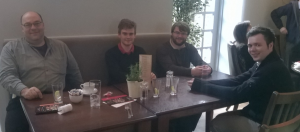By: Josef Svenningsson, Chalmers University of Technology, Sweden
Feldspar is a domain specific language with the goal of raising the
level of abstraction for performance sensitive, low-level code.
Feldspar is a functional language embedded in Haskell, which offers a
high-level style of programming. The key to generating generating
efficient code from such descriptions is to use a high-level
optimisation technique called vector fusion. Feldspar achieves
vector fusion for free by employing a particular way of embedding the
language in Haskell by combining deep and shallow embeddings.
Bio: Josef Svenningsson is an Assistant Professor in the Functional
Programming group at Chalmers University of Technology. He has a broad
range of interest and has published papers on wide variety of topics,
including: program analysis, constraint solving, security, programming
language design, testing and high-performance computing.
Event details
- When: 21st October 2014 14:00 - 20th October 2014 15:00
- Where: Cole 1.33
- Series: School Seminar Series
- Format: Seminar


